Tour of Ida Applebroog. Marginalias
- Encounter
- Guided Tour
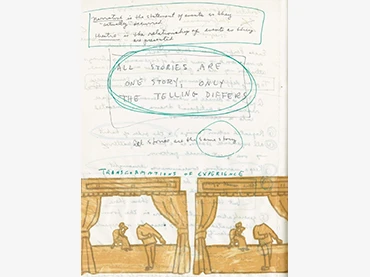
Ida Applebroog, Scripts. 100 Notes, 100 Thoughts (Hatje Cantz Verlag, 2011), published in conjunction with documenta 13
Held on 08 jun 2021
Soledad Liaño, curator of Ida Applebroog. Marginalias, leads a tour around the said exhibition, taking selected readings from the artist’s diary, to be recited publicly for the first time alongside her visual work by actress Nuria Mencía.
The work of Ida Applebroog (New York, 1929) examines violence and power, women’s sexuality, domestic space, and gender discourse. Across more than five decades, the artist has carried out an in-depth exploration of these major themes, using her practice to survey human relationships, their representations and the roles they impose. As a member of different US art collectives since 1980, for instance the Heresies Collective and Women’s Action Coalition (WAC), her work is inextricably linked to her feminist commitment. Applebroog works with poor images from the mass media, which bring to mind comics and popular iconography, despite them leading her towards a warped and disturbing zone. As the artist puts it:
When I think about the work, I think about living in this world; with overwhelming amounts of information: TV news and tabloids, radio, film, magazines; it’s so overloaded. Like a scavenger, I’m always collecting images: I take the world I live in, and put it outside of me. There are times when I just can’t take on one more bit of news. You turn on the eleven o’clock news and it’s another murder, a fire, Bosnia…You feel the need for a catharsis. Let me get all that crap out of me. Put it on the canvas and get rid of it, only to be faced with it again the very next day. But there is also good news; life goes on the following day.
("Ida Applebroog, Jill Baroff and Lauren Szold by Suzanne McClelland", BOMB 51, April 1995, New York).
Applebroog’s work stretches across a broad plastic and visual landscape: books, sculptures, videos, painting, drawings. Her experimentation with writing in its most existential and sarcastic form runs commonly through these mediums, with her diaries jutting out, constituting a project she began compulsively upon her return to New York at the beginning of the 1970s, when she spent long periods in isolation. These diaries are a key source to understanding her oeuvre and come together in a melting pot of reflections, ideas and concepts that form the backbone of her artistic output. The fragments selected and recited in this encounter link the intimate space of the artist with the theatrical and performative side of her work.
Nuria Mencía (1972, Madrid) is an actress. She graduated in Performance Studies at the Royal Higher College of Performing Arts in Madrid, and received the Spanish Actors Union Prize for her role in the work San Juan, directed by Juan Carlos Pérez de la Fuente (1999). Moreover, she has been nominated for the Max Awards for the Performing Arts on five occasions, receiving the Award for Alfredo Sanzol’s La respiración in 2017. She has worked on stage productions and in film and television.
Soledad Liaño is an exhibition curator and coordinator at the Museo Reina Sofía. She is curator of the show Ida Applebroog. Marginalias.
Organiza
Museo Reina Sofía
Programa
Encuentros
In collaboration with
illycaffèParticipants

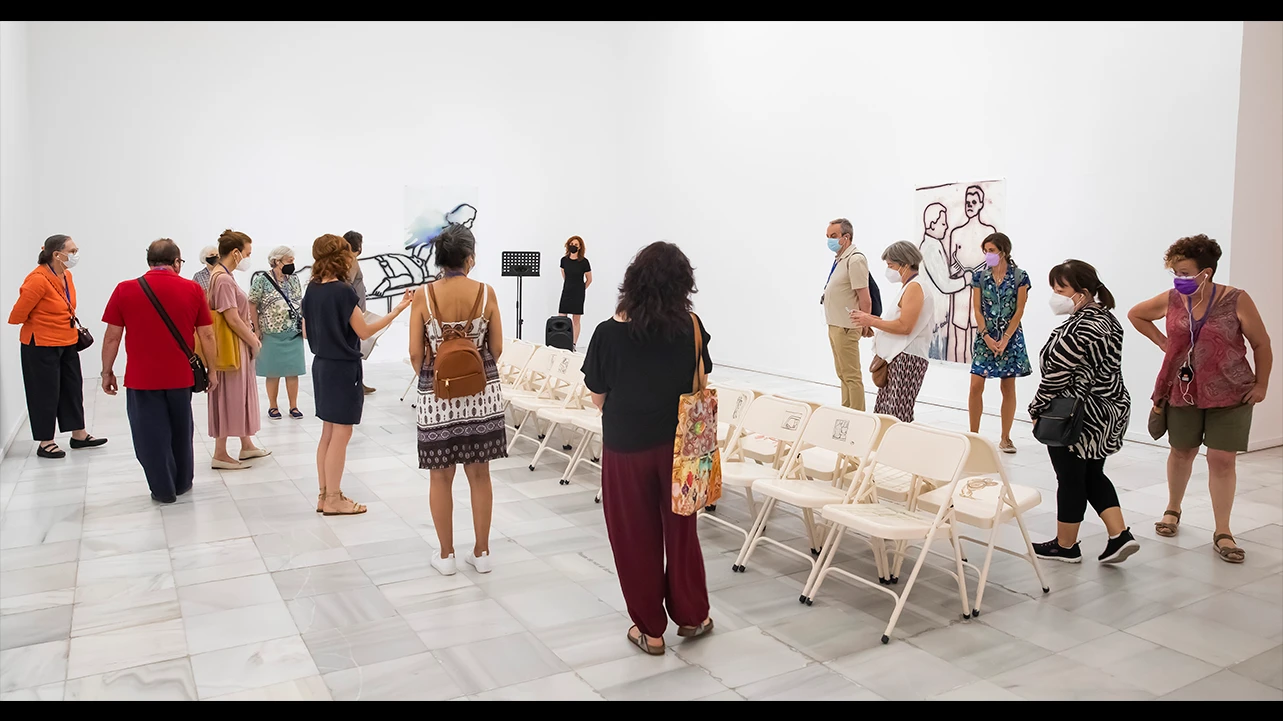
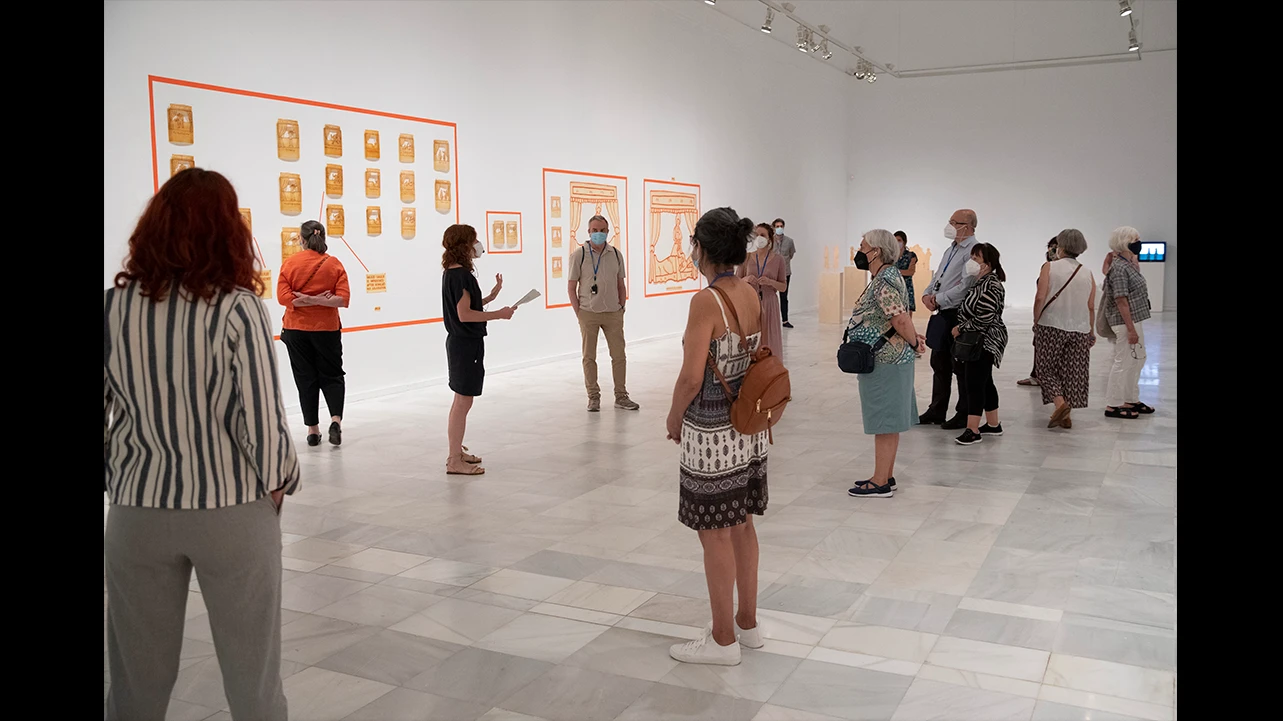
Más actividades
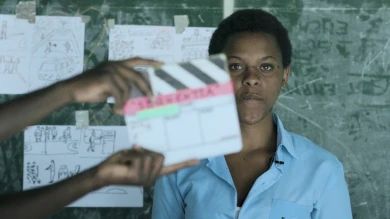
Christian Nyampeta and the École du soir
13, 14, 15 NOV, 11, 12, 13 DIC 2025
Christian Nyampeta is a Rwandan artist, musician and film-maker whose work encompasses pedagogies and community forms of knowledge production and transmission. His Ècole du soir (Evening School) is an art project conceived as a mobile space of collective learning and is named in homage to Ousmane Sembène (1923–2007), a pioneer of African cinema who defined his films as “evening classes” for the people, a medium of education and emancipation through culture.
This block is made up of three double sessions: the video work of Christian Nyampeta, the films of École du soir and one of Ousmane Sèmbene’s feature-length films. Nyampeta will introduce all three first sessions.
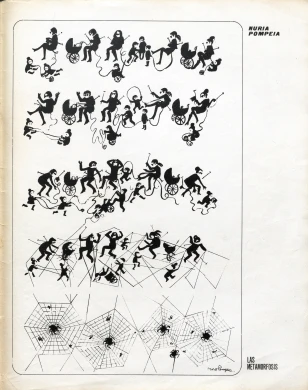
Crossed Vignettes
Friday, 21 November 2025 – Check programme
The Crossed Vignettes conference analyses the authorship of comics created by women from an intergenerational perspective and draws from the Museo Reina Sofía Collections. Across different round-table discussions, the programme features the participation of illustrators Marika, Carla Berrocal, Laura Pérez Vernetti and Bea Lema and researchers Viviane Alary, Virginie Giuliana and Elisa McCausland.
The aim of the encounter is twofold: to explore in greater depth the different forms in which women comic book artists have contributed to developing a counterculture; namely, the appearance of ruptures, reformulations and new genres within the ninth art. And to set up a dialogue which ignites an exploration of genealogies linking different generations of artists.
Moreover, the activity is put forward as a continuation to the exhibition Young Ladies the World Over, Unite! Women Adult Comic Book Writers (1967–1993) and the First International Conference on Feminist Comic Book Genealogies, held in April 2024 at the Complutense University of Madrid.
In redefining the visual narratives of the comic book and questioning gender stereotypes in a male-dominated world, women comic book writers and artists have impelled greater visibility and a more prominent role for women in this sphere. The study of intergenerational dialogue between female artists past and present enables an analysis of the way in which these voices reinterpret and carry the legacy of their predecessors, contributing new perspectives, forms of artistic expression and a gender-based hybridisation which enhances the world of comics.
The conference, organised jointly by the Museo Reina Sofía and Université Clermont Auvergne/CELIS (UR4280), is the outcome of the following projects: The Spanish Artistic Canon. Between Critical Literature and Popular Culture: Propaganda, Debates, Advertising (1959–1992), Casa de Velázquez (CALC); Horizon Europa COST Actions iCOn-MICs (Comics and Graphic Novels from the Iberian Cultural Area); and COS-MICs (Comics and Sciences).
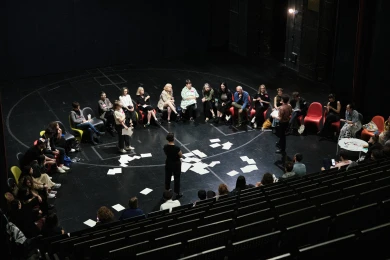
UP/ROOTING
11, 12, 13, 14, 15, 16 NOV 2025
Museo Reina Sofía and MACBA Museu d'Art Contemporani de Barcelona (MACBA) invite applications for the 2025 iteration of the School of Common Knowledge, which will take place from November 11th to 16th in Madrid and Barcelona.
The School of Common Knowledge (SCK) draws on the network, knowledge and experience of L’Internationale, a confederation of museums, art organizations and universities that strives to reimagine and practice internationalism, solidarity and communality within the cultural field. This year, the SCK program focuses on the contested and dynamic notions of rooting and uprooting in the framework of present —colonial, migrant, situated, and ecological— complexities.
Building on the legacy of the Glossary of Common Knowledge and the current European program Museum of the Commons, the SCK invites participants to reflect on the power of language to shape our understanding of art and society through a co-learning methodology. Its ambition is to be both nomadic and situated, looking at specific cultural and geopolitical situations while exploring their relations and interdependencies with the rest of the world.
In the current context fraught with war and genocide, the criminalization of migration and hyper-identitarianism, concepts such as un/belonging become unstable and in need of collective rethinking:
How can we reframe the sense and practice of belonging away from reductive nationalist paradigms or the violence of displacement? How to critically hold the entanglement of the colonial routes and the cultural roots we are part of? What do we do with the toxic legacies we inherit? And with the emancipatory genealogies and practices that we choose to align with? Can a renewed practice of belonging and coalition-making through affinity be part of a process of dis/identification? What geographies —cultural, artistic, political— do these practices of de/centering, up/rooting, un/belonging and dis/alignment designate?
Departing from these questions, the program consists of a series of visits to situated initiatives (including Museo Situado, Paisanaje and MACBA's Kitchen, to name a few), engagements with the exhibitions and projects on view (Project a Black Planet: The Art and Culture from Panafrica), a keynote lecture by Stefano Harney and Fred Moten, as well as daily reading and discussion gatherings, editorial harvest sessions, and conviviality moments.
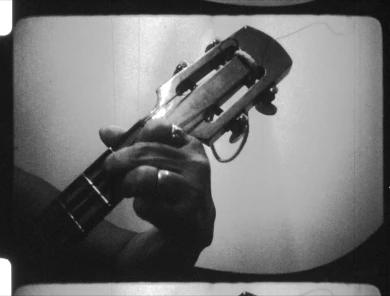
The Joaquim Jordà Residencies 2025
Friday, 7 November 2025 - 7pm
In this activity, the recipients of the 2024–2025 Joaquim Jordà Residencies call, María Aparicio (Argentina, 1992) and Andrés Jurado (Colombia, 1980), present respective projects related to their body of work in an open session in which to discover the creative interests of two of the most up-and-coming independent film-makers in Latin America today.
María Aparicio presents the working process behind her film De sol a sol (From Sun to Sun), along with a brief journey through the films prior to this project and her filmic searches in recent years. Aparicio synthesises the storyline of De sol a sol from the silhouettes of a group of men who appear between the stalks of a reedbed. Their knives glisten as the sun hits them, flashing and disappearing with their hand movements. Apprentices split the canes using no method; seasoned workers cut with skill. They are workers from a sugar mill in northern Argentina and are watched by Juan Bialet Massé, accompanied by Rosich, assistant and photographer. It is Argentina in 1904 and he is carrying out a mission assigned to him by his country’s government: to travel the Argentinian provinces, reporting on the state of the working classes.
Andrés Jurado, for his part, will look over his own work and the work of the La Vulcanizadora lab in this session. He will also open the archive stemming from the research process in the project Tonada, a journey through the succession of peace agreement betrayals in the history of Colombia. From the colonial era, understood in tumultuous terms, as a hurricane that keeps swirling, to the present day he traces the stories of people like Tacurrumbí, Benkos Biohó, Bateman and the many women and men who were betrayed by governments and oppressors. Tonada seeks to build a sound and film dialogue between the guerrilla disarmament of 1953 and the period following the peace agreement of 2016, invoking these and other events and confronting traumas of betrayal through a film composition devised to be sung. But what is sung? Some of these songs are heard and voices are shared in this presentation.
The Joaquim Jordà Residences programme for film-makers and artists was set in motion by the Museo Reina Sofía in 2022. The initiative comprises a grant for writing a film project rooted in experimentation and essay, as well as two subsequent residencies in FIDMarseille and Doclisboa, international film festivals devoted to exploring non-fictional film and new forms of audiovisual expression.
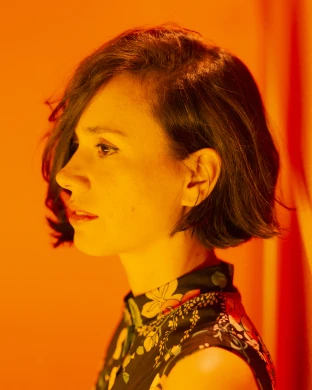
Ylia and Marta Pang
Thursday, 6 November - 8pm
The encounter between Spanish DJ and producer Ylia and visual artist Marta Pang is presented in the form of a premiere in the Museo Reina Sofía. Both artists converge from divergent trajectories to give form to a new project conceived specifically for this series, which aims to create new stage projects by setting out from the friction between artists and dialogue between disciplines.

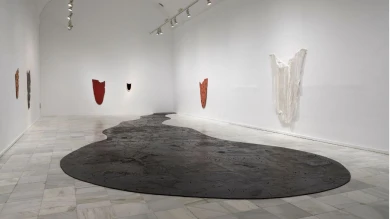
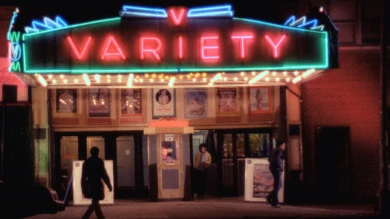
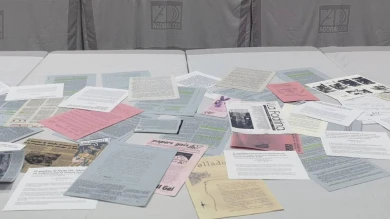
![Miguel Brieva, ilustración de la novela infantil Manuela y los Cakirukos (Reservoir Books, 2022) [izquierda] y Cibeles no conduzcas, 2023 [derecha]. Cortesía del artista](https://recursos.museoreinasofia.es/styles/small_landscape/public/Actividades/ecologias_del_deseo_utopico.jpg.webp)
![Ángel Alonso, Charbon [Carbón], 1964. Museo Reina Sofía](https://recursos.museoreinasofia.es/styles/small_landscape/public/Actividades/perspectivas_ecoambientales.jpg.webp)